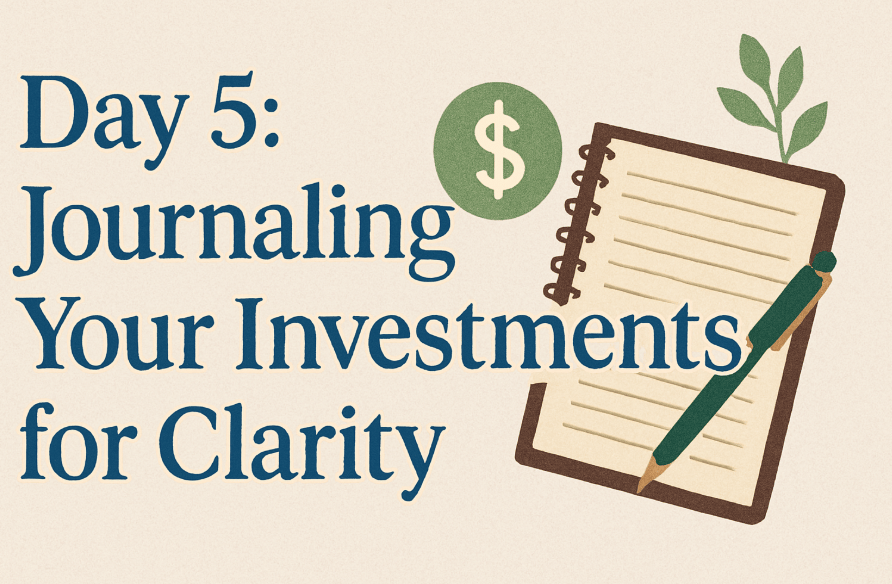- Live Life Grow Wealth
- Posts
- 💡Series 5 Day 5: Journaling Your Investments for Clarity
💡Series 5 Day 5: Journaling Your Investments for Clarity

Today’s Headline
💡 Series 5: Investor’s Mindset & Habits
Day 5: Journaling Your Investments for Clarity
One of the most underrated habits in investing is journaling. Most people think investing is all about numbers, charts, and timing the market. But here’s the truth — investing is also deeply emotional and psychological. How you think and feel about your investments can affect your decisions just as much as the data itself.
That’s where journaling comes in. For me, journaling isn’t just about keeping records of what I bought and sold. It’s about understanding why I made those decisions. It helps me spot my patterns — the good ones and the bad ones. Over time, this simple habit has helped me make smarter, calmer, and more confident investment choices.
Want to get smarter — not just richer? Tap into curated financial wisdom from Money and stay ahead of the next big move in investing.
Get home insurance that protects what you need
Standard home insurance doesn’t cover everything—floods, earthquakes, or coverage for valuable items like jewelry and art often require separate policies or endorsements. Switching over to a more customizable policy ensures you’re paying for what you really need. Use Money’s home insurance tool to find the right coverage for you.
Why Journaling Matters
Let’s start with a question: how many times have you made a financial decision and later wondered, “Why did I do that?” Maybe you sold a stock too early out of fear. Or maybe you held onto something too long because you didn’t want to admit it was a mistake.
Without journaling, those moments pass and you forget what caused them. But when you write things down, you start to see patterns. You can connect your decisions to your emotions, market events, or personal circumstances.
For example:
Were you influenced by panic in the news?
Did you follow a friend’s tip?
Or were you calm, rational, and sticking to your plan?
Your journal gives you a mirror to see your true investor self — not the version you wish you were.
What to Record in an Investment Journal
Many people don’t journal because they don’t know where to start. The good news is, it doesn’t have to be complicated. Here’s what I usually include in my investment journal:
Date of the transaction.
This helps you track when you entered or exited an investment and what the market looked like at the time.What I bought or sold.
Record the company name, stock symbol, and the amount invested or sold.Price and market condition.
Write down the price you bought or sold at, and describe what was happening in the market that day — was it bullish, bearish, or volatile?The reason behind the decision.
This is the most important part. Be honest with yourself. Why did you buy or sell? Was it because of solid research, or was it fear, greed, or FOMO (fear of missing out)?How I felt at the time.
This helps you track emotional triggers. Were you confident? Nervous? Excited? Writing this down helps you see how emotions influence your choices.What I learned.
Every investment teaches you something, whether it’s a win or a loss. Always end your entry with one key takeaway.
This doesn’t need to take hours. Even five minutes after each trade can make a huge difference.
The Psychology Behind It
Our brains are wired to forget emotional pain. That’s why most people remember their wins but quickly forget their mistakes. But your mistakes are your best teachers — if you learn from them.
By journaling, you force yourself to confront your past decisions honestly. You’ll start noticing patterns like:
“I often sell too quickly when the market dips.”
“I buy impulsively after seeing positive news headlines.”
“I feel confident when I follow my long-term plan.”
This awareness is powerful. Once you understand your behavior, you can start to change it.
Turning Mistakes into Lessons
I’ll share a quick personal story. Early in my investing journey, I bought a tech stock because everyone on social media was talking about it. I didn’t research it — I just followed the hype. Within weeks, the price dropped 30%. I panicked and sold, locking in a loss.
Months later, that same stock recovered and went on to double in value. I was frustrated, but instead of brushing it off, I wrote about it in my journal. I described exactly what I felt — fear, regret, and the pressure to follow the crowd.
That single journal entry became one of my biggest lessons. Since then, whenever I feel the urge to buy something just because it’s “hot,” I go back and read that entry. It reminds me not to repeat the same mistake.
Without that journal, I probably would’ve forgotten the lesson.
How Journaling Improves Decision-Making
Journaling sharpens your thinking in several ways:
It slows you down.
When you write before making a trade, you pause and think. That moment of reflection can prevent impulsive decisions.It clarifies your strategy.
Over time, your notes reveal what works for you and what doesn’t. You’ll start to see patterns that guide your future moves.It reduces emotional noise.
When markets are volatile, emotions can cloud your judgment. Writing your thoughts helps release those emotions instead of letting them drive your decisions.It builds confidence.
You’ll start to trust yourself more. You’ll know that your choices are based on logic, not feelings.It tracks your growth.
Looking back on old entries is inspiring. You’ll see how far you’ve come — from uncertain to informed, from reactive to strategic.
Journaling Isn’t Just for Stocks
Your investment journal can include more than just stock trades. You can use it for your entire financial life:
Real estate decisions
Saving and budgeting goals
Insurance planning
Retirement strategies
Write about your financial wins, fears, and thoughts about money. This helps you see the bigger picture of your financial mindset.
"Boost your investment strategy by unlocking the power of CTV advertising with Roku Ads Manager—learn how to maximize returns this holiday season. Click here to explore!"
Find your customers on Roku this Black Friday
As with any digital ad campaign, the important thing is to reach streaming audiences who will convert. To that end, Roku’s self-service Ads Manager stands ready with powerful segmentation and targeting options. After all, you know your customers, and we know our streaming audience.
Worried it’s too late to spin up new Black Friday creative? With Roku Ads Manager, you can easily import and augment existing creative assets from your social channels. We also have AI-assisted upscaling, so every ad is primed for CTV.
Once you’ve done this, then you can easily set up A/B tests to flight different creative variants and Black Friday offers. If you’re a Shopify brand, you can even run shoppable ads directly on-screen so viewers can purchase with just a click of their Roku remote.
Bonus: we’re gifting you $5K in ad credits when you spend your first $5K on Roku Ads Manager. Just sign up and use code GET5K. Terms apply.
What I Learned from Journaling
Over the years, journaling has taught me a few powerful lessons:
Clarity beats speed. Writing forces me to think before acting.
Feelings fade, but records stay. It’s easy to misremember events — journals don’t lie.
Data means little without reflection. Knowing the numbers isn’t enough; understanding yourself is the real edge.
Growth happens slowly. Each entry, no matter how small, adds up to better discipline and awareness.
How to Make It a Habit
If journaling feels like extra work, here’s how to make it stick:
Keep it simple.
You don’t need fancy tools. A notebook, an Excel sheet, or even your phone’s notes app works fine.Set a routine.
Write right after every trade or once a week when reviewing your portfolio.Be honest.
Your journal is private. Write the truth — even if it’s uncomfortable. That’s where real growth happens.Review regularly.
Once a month or quarter, read through your entries. Look for patterns and insights.Reward yourself for consistency.
Celebrate staying disciplined, not just profitable.
Common Mistakes to Avoid
Here are a few things to watch out for when journaling your investments:
Writing too little. A few vague notes like “bought this stock, looks good” won’t help you later. Add context and reasoning.
Blaming the market. Focus on what you controlled, not external events. That’s how you improve.
Ignoring emotions. It’s okay to admit you were scared or greedy. The goal is self-awareness, not perfection.
Not reviewing past entries. The value of journaling comes from reflection, not just writing.
The Connection Between Journaling and Patience
Journaling builds patience because it trains you to slow down. When you take time to write and reflect, you’re less likely to react impulsively. You learn to see investing as a process, not a race.
It also strengthens your belief in long-term thinking. When you look back and see how your investments grew over months or years, it reinforces the power of staying consistent.
Why Professionals Do It Too
Even professional investors and fund managers journal their decisions. They call it “post-trade analysis.” They write down their investment thesis, expectations, and outcomes.
Why? Because they know emotions and biases affect everyone — even the experts. Journaling gives them accountability and clarity.
If professionals do it to sharpen their edge, we should too.
My Favorite Part About Journaling
The best part about journaling isn’t seeing your wins — it’s seeing your growth. Reading old entries where I was nervous or uncertain reminds me how far I’ve come.
It also gives me gratitude. Even when I made mistakes, I see them as stepping stones to becoming a better investor. Every note, every reflection, every lesson adds to that journey.
Final Takeaways
Journaling your investments might seem like a small thing, but it’s one of the most powerful habits you can build. It gives you clarity, discipline, and self-awareness — the real foundations of long-term success.
Numbers can tell you what happened, but your journal tells you why it happened. And that’s the knowledge that helps you grow.
So the next time you make an investment decision — big or small — take five minutes to write it down. You’ll thank yourself later.
Call to Action
Here’s your challenge for today: start your investment journal. Open a notebook or a new file, and write your first entry. Record your current investments, why you chose them, and how you feel about them.
Don’t worry about perfection — just start. Over time, your journal will become your most valuable investment tool, one that guides you through both good and bad markets.
Remember, clarity creates confidence — and confidence creates success. Start journaling today and take control of your financial story.
[Live Life Grow Wealth]
🎓 Free Masterclasses to Unlock Your Investment Potential
Take your money skills to the next level with expert-led workshops designed to help you grow smarter and faster.
Recommendations Section
|
|
|
DISCLAIMER
I make no representations, warranties, or guarantees, whether expressed or implied, that the content provided is accurate, complete, or up-to-date. Past performance is not indicative nor a guarantee of future returns.
I am an individual content creator and not regulated or licensed by the Monetary Authority of Singapore (MAS) as I do not provide investment services.
All forms of investments carry risks, including the risk of losing your entire invested amount. Such activities may not be suitable for everyone. You are strongly encouraged to seek advice from a professional financial advisor if you have any doubts or concerns.








